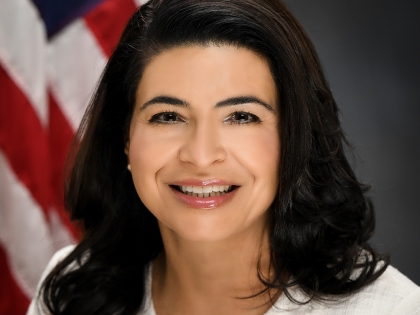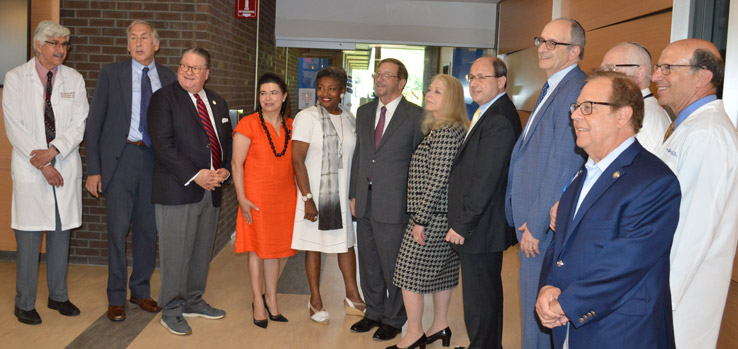
NYMC highlights $1M in state funds for disaster training

The New York Medical College (NYMC) Center of Excellence in Precision Responses to Bioterrorism and Disasters, which is housed in NYMC’s Center for Disaster Medicine, had its place in the sun on June 29 as scores of invited guests gathered under a tent in front of the center’s 7 Dana Road headquarters on NYMC’s Valhalla campus.
The event was to celebrate the work of the center while thanking state senators who helped secure $1 million in state funding for the center this year.
New York state has increased its financial support for the center from an initial amount of $500,000 in 2017 to today’s $1 million annual level.
NYMC describes the center as the first civilian resource of its kind in the nation. It offers education, training, structured simulations, drills and consulting to prepare for bioterrorism and mass casualty incidents along with natural and man-made disasters. Training is offered to first responders and law enforcement along with the business, education and health care sectors.
Among the facilities at the center are sensory deprivation and sensory overload training rooms, a simulated clandestine drug laboratory, a simulated residential apartment, simulated patient rooms and an intensive care unit. Mannequins are used allowing for practice of procedures such as airway management and insertion of chest tubes.
The center is funded through the Empire State Development Corporation’s Division of Science, Technology and Innovation program. The center is one of 11 Centers of Excellence in New York.
“As we continue to face down the pandemic, our world has never been in greater need of repair. In response, this center, the Center for Disaster Medicine is helping fulfill New York Medical College’s mission to offer solace, help and service by protecting the health of New York citizens and those around the world who look here for guidance,” Rabbi Moshe D. Krupka said in his invocation.
Alan Kadish, president of NYMC and the Touro College and University System, said, “Despite our sophistication both politically and scientifically, in the current century we’ve been faced with a number of huge surprises: 9/11, hurricanes Sandy and Katrina, the Covid pandemic and just this past week the terrible collapse of a residential tower in Surfside, Florida, in Dade County.
“Despite everything we’ve accomplished as a society, disasters both natural and man-made still happen and that’s why the Center for Disaster Medicine is so important because regardless of where we think we are we know, unfortunately, that these challenges will happen in the future and the job of educating first responders, public health officials and the general public about how to do better next time, how to respond better to the next pandemic, that’s crucial for our society.”
Kadish noted that the center had held training programs in responding to diseases such as Ebola, Zika and flu and did its first webinar on Covid-19 on Jan. 31, 2020, before there was a single case of coronavirus in the U.S.
“The Center for Disaster Medicine has tried to remain in the forefront of helping us prepare for these disasters,” Kadish said.
State Senate Majority Leader Andrea Stewart-Cousins said, “Here we are in 2021 and we know there’s no typical emergency, we know that there’s no one way to handle anything that happens, and we know that the responsibility of making sure that the public service and the public safety is secure falls on government, and falls on our health care system in a whole lot of ways.”

State Sen. Peter Harckham was credited with helping lead the effort to secure increased funding for the center.
“I very early on realized the importance of this center, both medically and as a jobs creator, as an economic engine, as an economic multiplier,” Harckham said. “Yes, we train for the big disasters that we hope and pray never come, but there are hundreds of little disasters every day all across this state and that’s what the medical college also helps us prepare for at a grass roots level.”
Robert W. Amler, NYMC’s vice president of government affairs and dean of the School of Health Sciences and Practice and Institute of Public Health, who served as master of ceremonies, had special praise for state Sen. Anna Kaplan of Nassau County who is chair of the senate’s Committee on Economic Development.
“It’s a committee with many, many aspects to it but they all drill down to the sharp point of a pencil and that is economic development, small business, improving the economy here in New York and the Northeast region,” Amler said, expressing thanks for her support of the Center of Excellence program.
Kaplan said, “We’re playing a very small role in trying to get you the funding and the resources that you need to do the great work that you do for our entire state.”
David S. Markenson, medical director for the Center for Disaster Medicine, said the additional $1 million in state funding will enable the center to offer more training where it is needed, such as for businesses.
“Businesses that have taken a taste of continuity of operations are now thirsty for it because they have understood that their survival is based on the ability to weather a storm and get through an emergency,” Markenson said.
NYMC’s Chancellor and CEO, Edward C. Halperin, said, “We honor those who have chosen to lend their support to this center. We express our thanks for senatorial support and we promise that at New York Medical College great things are happening to make this world a safer place shielded from the ill stars.”



